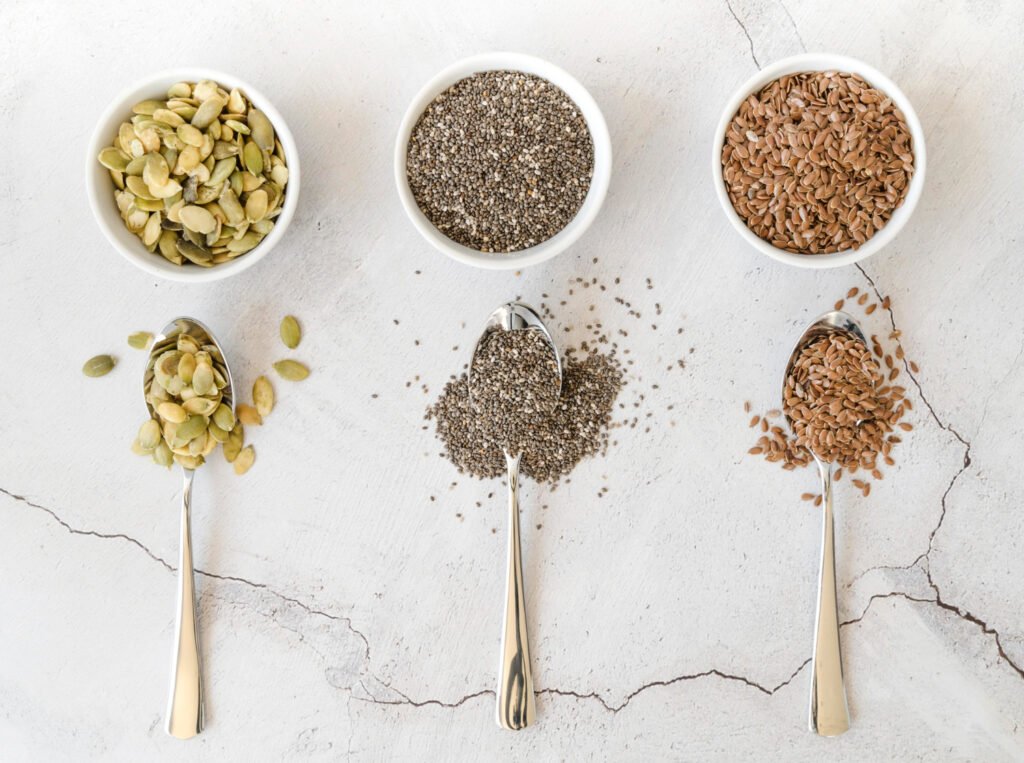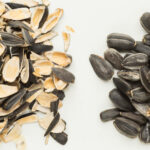
Overview
In the world of superfoods, two seeds stand out for their incredible health benefits: chia seeds and flaxseeds. Both are nutritional powerhouses, but when it comes to choosing between them, which is the healthier option? In this blog post, we’ll explore the nutritional differences, health benefits, and potential downsides of chia seeds and flaxseeds to help you make an informed decision. Whether you’re looking to boost your heart health, improve digestion, or balance your hormones, this article will guide you through everything you need to know.
Nutritional Chia Seeds vs. Flaxseeds
While both chia and flaxseeds are packed with nutrients, they have slight differences in their composition that may influence your choice.
Chia Seeds
Related: health benefits of chia seed water
Related; Health Benefits of Chia Seeds
- Omega-3 Fatty Acids: Chia seeds are an excellent source of alpha-linolenic acid (ALA), an omega-3 fatty acid that supports heart health and reduces inflammation.
- Fiber: Chia seeds are high in dietary fiber, which promotes digestive health and helps maintain a feeling of fullness—important for weight management.
- Protein: Chia seeds contain all nine essential amino acids, making them a complete protein source. This is particularly beneficial for those following a vegetarian or vegan diet.
- Antioxidants: Chia seeds are rich in antioxidants, which protect the body from oxidative stress and inflammation.
Flaxseeds
- Omega-3s: Like chia seeds, flaxseeds are rich in ALA, supporting cardiovascular health and reducing inflammation.
- Lignans: Flaxseeds are one of the best sources of lignans, a type of antioxidant that may reduce the risk of hormone-related cancers and support hormonal balance.
- Fiber: Flaxseeds are also high in fiber, promoting digestive regularity and helping to control blood sugar levels.
- Protein: Although flaxseeds contain a good amount of protein, they are not considered a complete protein like chia seeds.
Health Benefits of Chia Seeds
- Supports Digestive Health: Chia seeds are rich in soluble fiber, which absorbs water to form a gel-like substance. This not only aids digestion but also helps prevent constipation.
- Promotes Heart Health: The omega-3 fatty acids in chia seeds help reduce inflammation, lower cholesterol levels, and improve overall heart health.
- Helps with Weight Management: The high fiber content in chia seeds promotes a feeling of fullness, reducing the likelihood of overeating.
- Regulates Blood Sugar: Chia seeds help stabilize blood sugar by slowing the digestion of carbohydrates, making them particularly beneficial for people with type 2 diabetes.
Health Benefits of Flaxseeds
- Balances Hormones: Flaxseeds are packed with lignans, which have been shown to support hormone balance, particularly in women. They may help reduce the risk of hormone-related cancers like breast cancer.
- Improves Skin Health: The omega-3s in flaxseeds help hydrate the skin and reduce inflammation, making them beneficial for conditions like acne or eczema.
- Supports Weight Loss: Flaxseeds are high in fiber, helping to promote fullness and reduce overall calorie intake.
- Lowers Cholesterol: Regular consumption of flaxseeds has been linked to lower LDL (bad) cholesterol levels, thanks to their fiber and omega-3 content
How to Use Chia Seeds and Flaxseeds
Both chia and flaxseeds are easy to incorporate into your daily diet. Here are some simple ways to use them:
- Chia Seeds: These seeds can be added to smoothies, yogurt, oatmeal, or used to make chia pudding. Chia seeds can also be used as an egg substitute in vegan baking—just mix one tablespoon of chia seeds with three tablespoons of water and let it sit until it forms a gel.
- Flaxseeds: Flaxseeds are best consumed ground, as whole flaxseeds may pass through the digestive system without being absorbed. Ground flaxseeds can be added to smoothies, baked goods, oatmeal, or sprinkled over salads.
Potential Downsides
While both chia and flaxseeds are packed with health benefits, there are some potential downsides to consider.
- Chia Seeds: Because chia seeds absorb a lot of water and expand, consuming them without sufficient hydration can cause digestive discomfort or even choking. Always soak chia seeds in water or another liquid before consuming.
- Flaxseeds: Some people may experience bloating or gas after consuming flaxseeds, especially if they’re not used to a high-fiber diet. Additionally, flaxseeds contain phytoestrogens, compounds that mimic estrogen in the body. While this can be beneficial for some, individuals with hormone-sensitive conditions should consult a healthcare provider before consuming large quantities.
Which is Healthier?
The answer to this question depends on your personal health goals. Both chia seeds and flaxseeds offer unique benefits, and the best choice for you will depend on what you’re looking to achieve:
- For Heart Health: Both chia and flaxseeds are excellent sources of omega-3 fatty acids, but chia seeds have a slight edge due to their higher overall omega-3 content.
- For Hormonal Health: Flaxseeds are the better choice for those looking to balance hormones or reduce the risk of hormone-related cancers, thanks to their high lignan content.
- For Protein: If you’re looking for a complete protein source, chia seeds are the winner, as they contain all nine essential amino acids.
- For Digestive Health: Both seeds are beneficial for digestion, but chia seeds may have a slight advantage due to their higher soluble fiber content.
The Takeaway
In the chia seeds vs. flaxseeds debate, it’s clear that both are incredibly nutritious and offer a wide range of health benefits. Instead of choosing one over the other, why not incorporate both into your diet? By doing so, you can take advantage of the unique properties that each seed offers—whether it’s boosting heart health, improving digestion, balancing hormones, or adding protein to your meals. These super seeds are a simple, versatile, and powerful way to enhance your overall well-being
Frequently Asked Questions
- Which is better for heart health, chia seeds or flaxseeds?
- Both chia seeds and flaxseeds are excellent for heart health due to their high content of omega-3 fatty acids. However, chia seeds have a slightly higher concentration of these essential fats, making them a better option for heart health.
- Can I eat chia seeds and flaxseeds together?
- Yes, you can eat chia seeds and flaxseeds together. Combining them allows you to benefit from the unique properties of both, such as chia’s complete protein and flaxseeds’ high lignan content for hormonal health.
- Do I need to grind chia seeds like flaxseeds?
- No, you don’t need to grind chia seeds. Unlike flaxseeds, chia seeds are easily digestible in their whole form, while flaxseeds must be ground to access their nutrients fully.
- Which seed is better for digestion, chia or flax?
- Both chia and flaxseeds support digestion, but chia seeds have more soluble fiber, which can help with regularity and promote gut health. Flaxseeds also aid digestion but are especially beneficial for controlling blood sugar.
- Are there any side effects to consuming chia or flaxseeds?
- Both seeds are safe when consumed in moderation, but chia seeds can cause digestive discomfort if not soaked in liquid beforehand. Flaxseeds may cause bloating or gas, especially in people not accustomed to a high-fiber diet.











